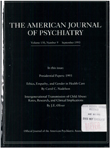Recovery and major depression: factors associated with twelve-month outcome
Abstract
OBJECTIVE: In spite of the prevalence and chronicity of major depression, there is no consensus regarding which clinical and psychosocial variables are associated with recovery. The authors examined the probability of recovery from a major depressive episode 12 months after hospital discharge, the factors most closely associated with recovery, and the patterns of improvement distinguishing patients who recovered from those who did not. METHOD: Seventy-eight inpatients with a DSM-III diagnosis of major depression were assessed at hospitalization and at monthly intervals for 12 months after discharge on a variety of clinical and psychosocial factors. Recovery status at 12-month follow-up was then used as a basis for comparing acute-phase patient characteristics and change in symptoms over time. RESULTS: By the 12th month of follow-up, 34 (48.6%) of 70 patients met criteria for recovery. The five most important factors related to recovery were shorter length of hospital stay, older age at onset of depression, better family functioning, fewer than two previous hospitalizations, and absence of comorbid illness. The majority of patients who had recovered by 12 months had done so within 6 months of discharge; the average length of time to recovery was 4.9 months. CONCLUSIONS: Patients hospitalized for major depression have less than a 50-50 chance of recovering by 1 year. Some variables associated with nonrecovery (e.g., comorbid illness, poor family functioning) are amenable to clinical intervention; however, findings also suggest that there may be two distinct types of depressive illness with respect to recovery, one that remits quickly and the other with a more prolonged course of illness.
Access content
To read the fulltext, please use one of the options below to sign in or purchase access.- Personal login
- Institutional Login
- Sign in via OpenAthens
- Register for access
-
Please login/register if you wish to pair your device and check access availability.
Not a subscriber?
PsychiatryOnline subscription options offer access to the DSM-5 library, books, journals, CME, and patient resources. This all-in-one virtual library provides psychiatrists and mental health professionals with key resources for diagnosis, treatment, research, and professional development.
Need more help? PsychiatryOnline Customer Service may be reached by emailing [email protected] or by calling 800-368-5777 (in the U.S.) or 703-907-7322 (outside the U.S.).



